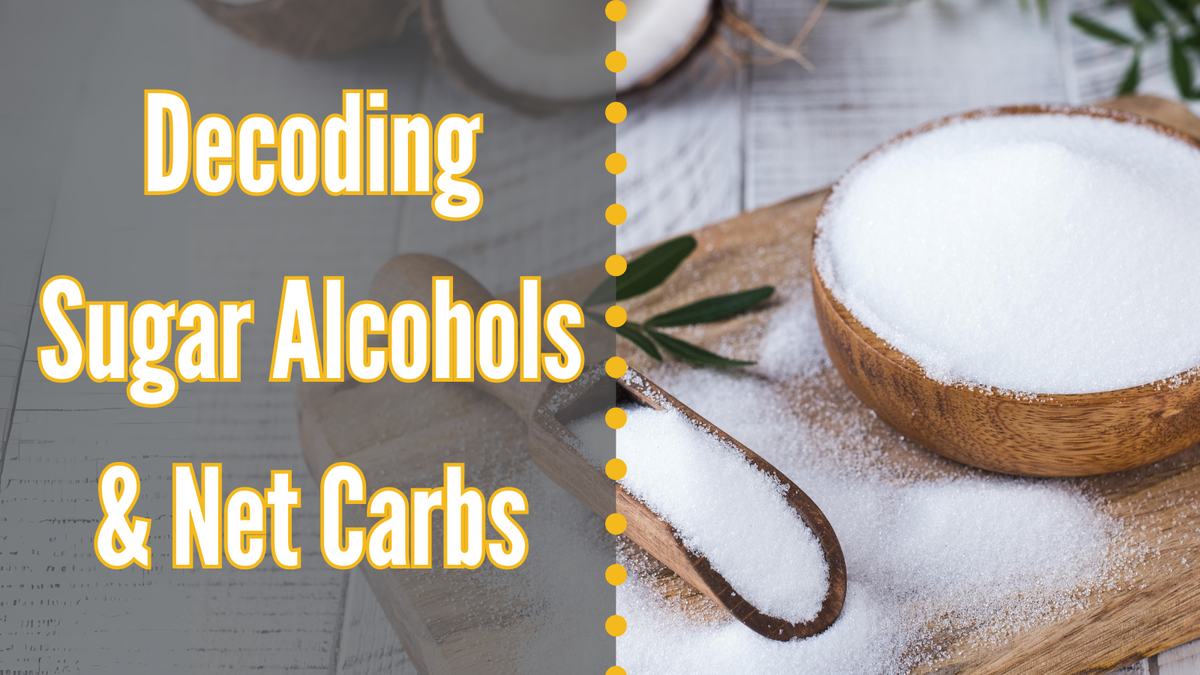Decoding Sugar Alcohols and Net Carbs: A Practical Guide for Low-Carb Dieters

Navigating the world of low-carb diets means understanding sugar alcohols and net carbs. But how exactly do sugar alcohols fit into calculating your daily carb intake?
This straightforward guide clears up how to adjust your net carb count when consuming products with sugar alcohols, ensuring your diet stays on track.
Key Takeaways
- Sugar alcohols are low-calorie sugar substitutes with varying impacts on blood sugar levels, so identifying them on labels is crucial for maintaining a low-carb diet.
- Net carbs are calculated by subtracting fiber and half the sugar alcohols (other than erythritol) from total carbs, helping low-carb dieters manage their carb intake and maintain stable blood sugar levels.
- Mindful inclusion of sugar alcohols in a low-carb diet can satisfy sweet cravings without large impacts to blood sugar, but moderation is required to avoid gastrointestinal discomfort and overconsumption.
Understanding Sugar Alcohols

Sugar alcohols, derived from sugars and found naturally in certain fruits and vegetables, are making waves as popular sugar substitutes.
They’re often added to ‘sugar-free’ processed foods including candies, cookies, and soft drinks, and have even found their way into toothpaste and mouthwash.
What makes them special? They can trigger the sweet taste receptors just like sugar, but with a lower calorie content, making them an appealing choice for those watching their calorie or sugar intake.
However, not all sugar alcohols are created equal. Their impact on blood sugar, calorie content, and sweetness level varies depending on their type.
Recognizing them on food labels is a vital ability for anyone aiming to sustain a low-carb diet, and our goal is to aid you in mastering this skill.
Common Types of Sugar Alcohols
Various sugar alcohols, including certain sugar alcohols, are utilized in food products. In addition to fiber and sugar alcohols, the most common sugar alcohols are found among most sugar alcohols and include:
- Xylitol
- Erythritol
- Sorbitol
- Maltitol
- Mannitol
- Hydrogenated starch hydrolysates (HSH)
- Isomalt
Xylitol, for instance, is a popular sugar alcohol used as a substitute for sugar. It can help decrease cavities, tooth decay, aid in relieving constipation, and even enhance bone mineral density.
Plus, it brings fewer calories and a lower glycemic index to the table compared to sugar.
On the contrary, Sorbitol is a natural component of fruits and frequently incorporated in chewing gums, candies, desserts, ice creams, and foods for diabetics.
Erythritol is another sugar alcohol, which studies suggest is superior to sorbitol and xylitol in promoting and improving oral health.
Although they all deliver a sweet flavor without the high calorie content of regular sugar, their potency and effect differ.
How Sugar Alcohols Affect Blood Sugar
One of the main reasons sugar alcohols are favored in low-carb diets is their minimal impact on blood sugar levels.
They do not cause sudden spikes in blood sugar and have a significantly lower glycemic index than regular sugar, ranging between 0 and 45.
This makes them a preferred choice over table sugar for those looking to maintain stable blood sugar levels.
Among them, erythritol is acknowledged for its very low impact on blood sugar levels. Even consumed in large amounts, the majority of sugar alcohols do not drastically influence blood sugar levels, which makes them fitting for those seeking to gratify their sweet cravings without escalating their carbohydrate consumption.
Net Carbs and Their Importance in Low-Carb Diets

Net carbs are indicative of the digestible carbohydrates in a food. For individuals adhering to low-carb diets such as keto, monitoring net carbs is a significant aspect of managing their carbohydrate consumption.
Essentially, they account for carbohydrates that can be digested and used for energy, excluding fiber and a portion of sugar alcohols that pass through the body undigested.
Calculating net carbs is straightforward for natural foods - you simply subtract the fiber from the total carbohydrates. However, processed foods that contain sugar alcohols require an additional step.
While fiber is completely subtracted from the total carbs, only half of the sugar alcohols are subtracted to account for their partial digestion.
Calculating Net Carbs
The formula to calculate net carbs is straightforward: NET CARBS = TOTAL CARBS – FIBER – SUGAR ALCOHOLS.
Therefore, when you’re reviewing the nutrition facts on a food label, you’ll need to identify the quantities of total carbohydrates and fiber specified for the food.
To calculate your net carbs, simply use the formula “total carbs minus fiber.” When it comes to subtracting sugar alcohols, it’s a bit more nuanced.
It’s recommended to subtract half of the grams of sugar alcohol (other than erythritol) listed on the food label from the total carbohydrates, as the body only partially digests these sugar alcohols.
Factors to Consider When Counting Net Carbs
Counting net carbs involves more than just arithmetic. The individual’s tolerance to carbohydrates can substantially influence the calculation of net carbs.
Factors such as blood sugar levels and sensitivity to carbs differ from person to person, affecting the overall calculation of net carbs.
The type of sugar alcohol used also influences the calculation of net carbs, including sugar alcohol carbs. Typically, half of the grams of sugar alcohol listed on the food label should be subtracted when counting net carbs.
Personal health goals, including the desire to lose weight, blood sugar management, and overall carbohydrate intake, should also be considered when calculating net carbs.
The Role of Sugar Alcohols in Low-Carb Diets

Sugar alcohols can serve as a valuable resource for individuals on low-carb diets. Their slight effect on blood sugar levels is essential in sustaining ketosis, a metabolic condition where the body utilizes fat as energy instead of carbohydrates.
They provide fewer calories than regular sugars and have a lower glycemic index, meaning they cause smaller spikes in blood sugar levels.
This makes them a preferred choice for low-carb dieters looking to satisfy their sweet cravings without significantly impacting their carbohydrate intake.
Pros of Using Sugar Alcohols
The advantages of using sugar alcohols are manifold, particularly for those aiming to regulate their blood sugar levels.
With a lower glycemic index than regular sugar, sugar alcohols can help manage blood sugar levels, making them a viable option for individuals following a low-carb diet or managing diabetes.
Some advantages of using sugar alcohols include:
- Lower glycemic index
- Can help manage blood sugar levels
- Suitable for low-carb diets
- Safe for individuals with diabetes
Moreover, sugar alcohols can aid in weight management. They provide a sweet taste without packing on the calories, making them appealing for individuals seeking to decrease calorie consumption or manage their weight.
They also show potential in promoting better oral health by reducing the risk of cavities and tooth decay.
Cons of Using Sugar Alcohols

While sugar alcohols bring several benefits to the table, they also have their downsides. Overindulgence in sugar alcohols may result in gastrointestinal discomfort, which can include symptoms like bloating, diarrhea, and abdominal pain.
Moreover, the sweet taste of foods containing sugar alcohols can lead to overconsumption of sweet-tasting foods, undermining the benefits of a low-carb diet. As with anything, moderation is key.
Tips for Incorporating Sugar Alcohols into Your Low-Carb Diet
Taming your sweet tooth while on a low-carb diet can be challenging. Thankfully, sugar alcohols can help. Choosing the right sugar alcohol and practicing moderation is the key to successfully incorporate them into your diet.
It’s suggested that individuals adhering to a low-carb diet should consume around 10 to 15 grams of sugar alcohol daily.
Adhering to this range can assist in preventing gastrointestinal side effects and sustaining a state of ketosis.
Choosing the Right Sugar Alcohol
Making the right choice of sugar alcohol for your low-carb diet can make a significant difference. Erythritol or xylitol are popular choices due to their minimal impact on blood glucose levels.
However, be aware that consuming sugar alcohols like erythritol and xylitol may lead to digestive problems, including:
- gas
- bloating
- diarrhea
- nausea
- constipation
To reduce these side effects, it’s crucial to moderate the intake of sugar alcohols and opt for those that are generally well-tolerated, such as erythritol.
Moderation and Mindful Consumption
While sugar alcohols can be beneficial in a low-carb diet, moderation is key. Consuming too much can lead to gastrointestinal discomfort, similar to the effects of excessive dietary fiber.
Adopting mindful eating habits can boost the success rate of a low-carb diet. It aids in:
- Stabilizing blood sugar levels
- Managing inflammation and appetite
- Aiding insulin regulation
- Assisting individuals in distinguishing hunger and satiety cues
It’s an essential tool in making healthier food choices and minimizing stress.
Decoding Food Labels for Sugar Alcohols and Net Carbs

One of the tools at your disposal when trying to manage your intake of sugar alcohols and net carbs is the humble food label.
Understanding how to read these labels can help you keep track of your intake and make informed decisions about your diet.
Nonetheless, food labels can sometimes be perplexing, given that sugar alcohols are frequently listed under a variety of names.
The FDA allows for the voluntary declaration of the sugar alcohols count in a serving on food labels. These are listed under Total Carbohydrate on the label.
Identifying Sugar Alcohols on Labels
Being able to identify sugar alcohols on food labels is a vital skill if you’re adhering to a low-carb diet. They are listed in the ingredient list, allowing consumers to recognize them at a glance.
However, sugar alcohols may be listed under various names, making it important to familiarize yourself with these names.
The FDA mandates that the content of sugar alcohols must be expressed to the nearest gram on the label. If a serving contains less than 1 gram, it can be stated as ‘Contains less than…’.
Verifying Net Carb Claims

Food manufacturers frequently emphasize ‘net carbs’ on their labels. However, these assertions can occasionally be deceptive, and it’s crucial to verify them independently.
To do this, look at the Total Carbohydrate on the Nutrition Facts label, and calculate the net carbs by subtracting the fiber from the total number of carbs.
Be wary of products excessively highlighting ‘net carbs’ on labels, the uncertain science supporting these claims, and specific allegations of deceptive marketing practices, such as those made against Atkins Nutritionals, Inc..
Summary
To sum up, sugar alcohols and net carbs can greatly aid individuals on low-carb diets. While sugar alcohols provide a sweet taste without significantly impacting blood sugar levels, understanding net carbs is crucial for maintaining dietary control.
However, it’s essential to practice moderation and mindful consumption of sugar alcohols to avoid potential gastrointestinal discomfort.
With the right knowledge and tools to decode food labels, you can make informed dietary choices that align with your health goals.

Frequently Asked Questions
Do you count sugar alcohols as carbs on keto?
Yes, sugar alcohols such as xylitol, mannitol, and erythritol don't count toward your net carbs while following a keto diet, but maltitol and sorbitol do.
Do sugar alcohols spike insulin?
No, sugar alcohols do not spike insulin because they are converted to glucose more slowly, requiring little or no insulin to be metabolized, and they don't cause sudden increases in blood sugar.
Do sugar alcohols count as carbs bodybuilding?
Yes, sugar alcohols count as carbs in bodybuilding, but they may be subtracted from the total carb count to calculate net carbs. This represents the actual amount of calories-containing carbohydrates.
Can erythritol kick you out of ketosis?
Erythritol is keto-friendly because it doesn't spike blood sugar or insulin, making it a good option for those on a ketogenic diet.
What are sugar alcohols and where can we find them?
Sugar alcohols are natural sugar substitutes found in certain fruits and vegetables, and commonly used in processed sugar-free food items like candies, cookies, and soft drinks. Be mindful of their presence in these products if you are looking to limit their consumption.


